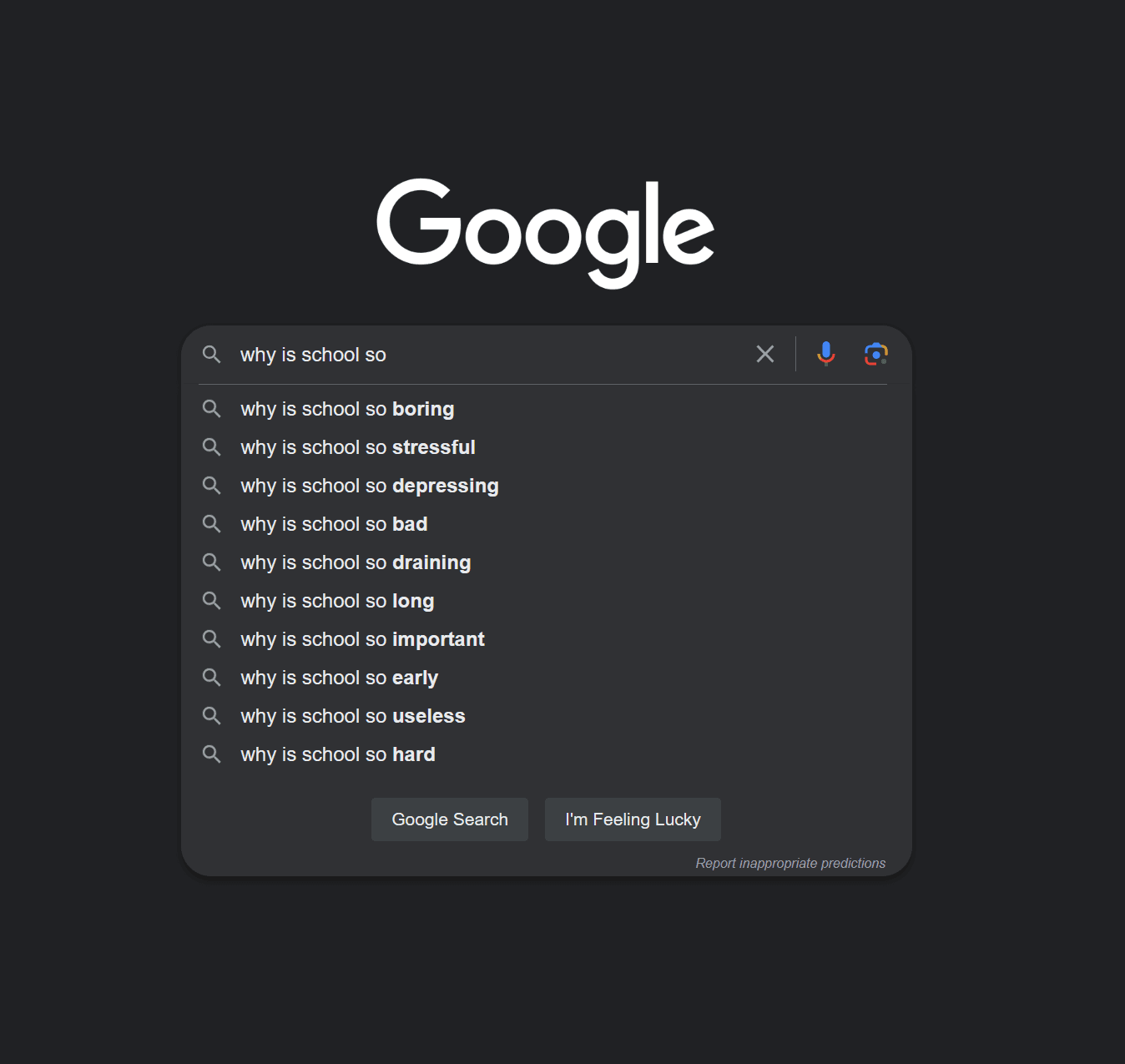Why Is School So…
Boring, stressful, depressing, bad and draining. These are the top 5 auto-fill suggestions. Students all over the world are asking why school is so unengaging – and they want answers!
By  Carl Morris
Carl Morris
Why Is School So…

Boring, stressful, depressing, bad and draining. These are the top 5 auto-fill suggestions. Students all over the world are asking why school is so unengaging – and they want answers!
Learning is essential to life. Have you ever wondered why humans are one of the only animals born without the ability to walk? It’s because our heads are too big! If we developed in the womb to a stage where we could already walk and communicate from day one, we wouldn’t fit through the birth canal. Instead we have evolved to be born before we develop these essential skills with our DNA coding for an innate ability to learn.
Kids are hard wired to absorb knowledge and skills from their surroundings. They pick up language simply by observing others, and they are totally unphased by asking whatever is on their mind – “Why is water wet?”, Where do thoughts come from?”, “Why don’t crabs have eyebrows?” – do get in touch if you know the answers.
“You go talk to kindergartners or first-grade kids, you find a class full of science enthusiasts. They ask deep questions. They ask, ‘What is a dream, why do we have toes, why is the moon round, what is the birthday of the world, why is grass green?’ These are profound, important questions. They just bubble right out of them. You go talk to 12th graders and there’s none of that. They’ve become incurious. Something terrible has happened between kindergarten and 12th grade.”
Professor George Land was hired by NASA to create an assessment that tests the creative potential of rocket scientists. They are searching for divergent thinkers who can approach problems from many different angles, and do not give up when one path brings them to a dead end. Needless to say you have to be in the very top percentile to make it to the next stage of recruitment. As the test is not knowledge specific, Professor Land decided to give it to 5 year olds to see how they scored. 98% of 5 year olds scored Genius Level creativity, the same children 5 years later only 30% reached the same level, another 5 years and we have dropped to 12%. When given to adults, only about 2% reach the ranks of genius creativity. Somewhere along the line we’ve taught our kids out of problem solving and looking at the world creatively, the core skill that encouraged us all to develop from helpless babies to independent young adults.
What is it about our education system that is so boring, stressful, useless, depressing and long, and what can we do to change it?
The rhetoric on the conference circuit that education hasn’t changed since the industrial revolution is nothing new, and it is usually accompanied by a suggestion that adding an extra piece of essential tech in the classroom could change everything! I believe we need much more drastic action. The world has moved on and is evolving at an accelerating pace, taking baby steps towards a new system, or adding bells and whistles to the system we already have will not be enough, the gap will widen. For most, the purpose of education is to get into a good career, and yet the way we work in schools is incredibly detached from the way that most adults work – especially since the shake-up of the pandemic.
Rather than go through a long list of inadequacies in the school system, I prefer focus on three areas that could be improved with the effective use of technology: relevance, flexibility, and accessibility.
"Educators are terrified that their obsolescence is only a few iterations away – but search engines & AI don’t work unless we ask good questions – this is what we need to be teaching"
Relevance
Is it not strange that we often blame students for their lack of engagement? Would you blame the movie goer for being bored by a film? We believe we know the perfect way a student should learn and expect them to conform to this structure or be labelled a disruptor – ironic that being a disruptor in the “real world” is often a fast track to success. There are as many ways to learn as there are people on the planet and expecting everyone to conform to a particular way of learning may be an efficient way to build a bricks and mortar school, but certainly won’t work for every child.
The solution is more variety in education. We should be celebrating the diversity of teaching approaches that different schools offer, and encouraging different methodology. Every report from every big data analyst across the globe is shouting about how Generation Alpha consume vast amounts of video content – so let’s make it, and no let’s not put a teacher in front of a whiteboard with an iPhone on a tripod, let’s watch the content they are consuming and make something we know they will enjoy and learn from!
ChatGPT has shown the world the power of having the world’s knowledge at our fingertips. Educators are terrified that their obsolescence is only a few iterations away – but search engines & AI don’t work unless we ask good questions – this is what we need to be teaching, and this is what engaged kids before we taught them out of their creativity. Let’s get students to research why crabs don’t have eyebrows!
"homeschooling became a dirty word during the pandemic, but when done right schooling on the go opens a world of possibility to both keep students engaged whilst offering the same flexible working their parents are enjoying."
Flexibility
WFH – every employer’s nightmare! Whether you think working from home is a blessing or a curse – it’s here to stay. Post-pandemic many careers that don’t require employees to be in the office every day have continued offering their teams the flexibility of when and where they work, largely due to the positive effects it has had on productivity and employee wellbeing. A new cottage industry of people renting their homes to nomadic workers kitted out with professional workspaces, and flexible hot desking solutions such as WeWork have become all the rage. However, if you’re a parent you can forget about jumping into this new lifestyle. Schools haven’t quite adopted this WFH mentality, and homeschooling became a dirty word during the pandemic, but when done right schooling on the go opens a world of possibility to both keep students engaged whilst offering the same flexible working their parents are enjoying. At The Online School we are developing a unique hybrid model that detaches the need for schooling to take place in a single geographical location, and gives the ownership of education back to the students.
Online Schools like Minerva Academy and Wolsey Hall are already overing students enormous flexibility in terms of when, how, and what they learn, and companies like Byju’s are offering hybrid online/offline schooling in India. We have just reached the tip of the iceberg with the doors that technology can open in terms of flexibility, but it will require a change in mindset of parents and education, and a reimagining of what school actually is. Employers have found that flexible working conditions have a massive positive impact on their businesses, and I believe that parents, students, and teachers will find the same for education
"Interschool networking gives students the opportunity to learn about other cultures from people their own age, teaching students core values of tolerance and respect"
Access
It is not always possible to get the best teachers, or industry experts into schools, but that doesn’t mean that children shouldn’t have access to them. A simple webcam and computer screen setup allows us to beam the world’s best educators, and most innovative leaders into every classroom to inspire and engage students. It is true that not every location has stable internet, but studies show that 63.5% of the world’s population now have access to the internet, with this number increasing every year the issue will not be how to get online, but what is being consumed online. Technology not only provides access to the world’s experts, but also facilitates communication between other students. The best learning often happens when we get students to discuss amongst themselves – check out Harvard Professor Eric Mazur’s Peer Instruction for a fantastic example of how this can be implemented into a classroom. Interschool networking gives students the opportunity to learn about other cultures from people their own age, teaching students core values of tolerance and respect, as well as seeing problems from new perspectives which all contribute to that divergent thinking – and a potential career as a rocket scientist.
There is no one answer to disengagement in schools, and solving this problem will require us to diversify our educational offerings to support a wide variety of learning abilities, styles, and interests. Technology is a fantastic tool that can be utilised to make education more relevant, flexible, and accessible – but it requires innovative and creative educators to build it. I hope the next time I search “Why is school so” it is followed by – inspiring.
This article was originally posted on Gess Talks - view the original here
To innovate, or to iterate, that is the question
It’s easy to think of our systems of education as behemoths built over centuries which only need to be tweaked to fit an ever-changing world, but are we focussing too much on iteration when we should be exploring innovation?
The Online School Joins The Virgin StartUp Community
We’re thrilled to announce that we have joined the Virgin StartUp community. This marks an important step towards advancing our mission of reinventing education to be more engaging, flexible, and accessible for learners everywhere.
AI and the quest for the Chicken Bulb
Over the past few months it has been hard to avoid the term Artificial Intelligence (AI). Educators, for the most part, have embraced this new technology and put their passions for lifelong learning to the test by trying to wrap their heads around this ground-breaking innovation.
